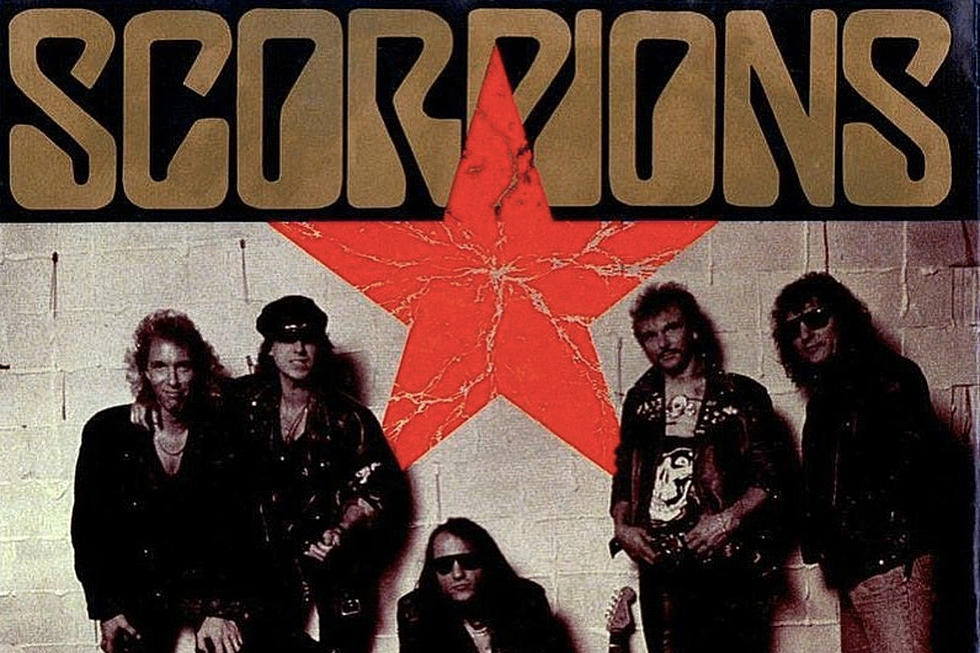
How Scorpions’ ‘Wind of Change’ Helped Define a Moment in History
Whether or not rock 'n' roll can affect world events is up for debate, but it's undeniable that Scorpions' 1991 hit "Wind of Change" captured a moment when history was being written around it.
"It's an anthem to historical changes," singer Klaus Meine, who wrote the song, said in Martin Popoff's Wind of Change: The Scorpions Story. "Here in our country, when the Berlin Wall came down, so many people, in the East and West ... consider it the soundtrack to this very historical moment. So, that's a very important song."
Half a decade earlier, the band, which had formed in 1965 in Hannover, West Germany, had broken through to the U.S. with Love at First Sting and the classic "Rock You Like a Hurricane." But the follow-up LP, 1988's Savage Amusement, was a step down by commercial standards, selling respectably in the U.S., even though only one of its singles, the No. 75 "Rhythm of Love," charted. But this coincided with an increasing openness in the Soviet Union to Western ideas, and another of Sting's singles, "Still Loving You," had become a hit in Russia.
Scorpions' songs generally weren't political; Love at First Sting's antiwar "Crossfire" was a notable exception. But growing up in the aftermath of World War II, and then seeing its country divided during its youth, made the band's decision to play rock 'n' roll an inherently political act. They saw themselves as ambassadors of a new attitude in West Germany - a role they took seriously.
"We always had the feeling when we went to different countries that we want to show the people that there's a new generation coming from Germany," guitarist Rudolf Schenker told Popoff. "Not coming with tanks - coming with guitars and bringing love. ... We told the promoter, we said we want to go to Russia. So, he made it possible, we played there, and for us this was a very important part to really show the Russian people that there is a new generation coming and they're making music."
The original plan was to play five nights in Leningrad and five in Moscow. But the authorities were worried that a riot could break out in Moscow, so Scorpions ended up playing 10 shows in Leningrad. "And it was fantastic," Schenker told Rolling Stone. "It was a dream come true to play in Russia."
A year later, in August 1989, they finally got the opportunity to play the Russian capital as part of the Moscow Music Peace Festival, a two-day concert in front of 100,000 people in Lenin Stadium organized by manager Doc McGhee as part of a plea bargain to avoid jail time on drug-trafficking charges. McGhee tapped his roster, including Ozzy Osbourne, Bon Jovi and Motley Crue. In the days leading up to the show, McGhee set up a junket on a boat that took the bands and the press along the Moskva River, with a party at Gorky Park as its destination.
"We were on this boat with all the bands, with MTV journalists, with Red Army soldiers," Meine recalled. "It was an inspiring moment for me. It was like the whole world was in that one boat talking the same language: music."
Meine added that when Scorpions started performing at the concert, "all the Red Army soldiers, all the security, they turned around to face the stage and started throwing their caps and jackets in the air. It was amazing. It felt like the world was changing right in front of our eyes. Many young Russian kids sensed that the whole Cold War generation would be over soon. There was a feeling of hope. And that’s what I tried to express in the song."
McGhee recalled that Meine had been whistling a melody on the bus coming back from the show, and within a day he'd written the bulk of "Wind of Change." Meine started with the memory of the boat ride - "I follow the Moskva down to Gorky Park" - and went from there.
Watch the Video for Scorpions' 'Wind of Change'
Within a few months, the Berlin Wall fell, and as the collapse of the Soviet Union spilled into 1990 and more republics that been taken over in the previous half-century became autonomous, Scorpions were holed up with producer Keith Olsen, who heard "Wind of Change" early in the process.
"It raised the hairs on my arms," he told Rolling Stone. "I had a copy of the lyrics, and it was just, 'Whoa' It was a very strong emotional statement. But it wasn’t a ya-ya-ya, rah-rah-rah political statement. It was so genuine."
But there was one aspect of the song he had to contend with first. "I guess I just whistled my way through it because, I mean, I play guitar, but I’m not a lead guitarist," Meine recalled. "So, I was just whistling and it went down pretty cool. I played it for the guys, and they liked the song, but they were not so sure about this whistling part."
However, they realized that any time they tried something else replacing the whistling - a guitar or keyboard - the song didn't work as well. So they were able to convince the record label to keep it in.
That August, Scorpions were asked by Roger Waters to participate in his performance of Pink Floyd's The Wall at the site of the Berlin Wall. "We said yeah, and it's a great idea," guitarist Matthias Jabs told Popoff. "It was something we've never done before, to play someone else's music onstage. It was the perfect place to play that show. Actually, being there was the greatest thrill, since we never had a chance in our whole lifetime to go to this part of East Berlin. It was right behind the wall, the bit they called the Death Zone, no man's land, and right on that no man's land, they set up the biggest stage in rock history."
Watch Scorpions Perform Pink Floyd's 'In the Flesh' With Roger Waters
That November, a month after the reunification of Germany, Scorpions released Crazy World. Two singles, "Tease Me Please Me" and "Don't Believe Her" failed to hit the Hot 100. Then "Wind of Change" was released in France and was soon topping charts across Europe. Even though the band was an established act on U.S. rock radio, "Wind of Change" first broke on Adult Contemporary stations in the States, before crossing over to rock and Top 40, where it peaked at No. 4 - Scorpions' biggest-ever hit in the U.S. They even took the song's success further, recording it in Spanish and Russian, with proceeds from the Russian version going to a children's charity.
Although the single was a global smash, and its follow-up, "Send Me an Angel," barely missed the Top 40, Crazy World peaked at only No. 21, going platinum within nine months of its release but not being certified for sales of 2 million until 1995. By comparison, Love at First Sting went double platinum after seven months on the shelves.
Perhaps more impressively, the song's impact had been felt in the corridor of power that inspired its creation. Soviet president Mikhail Gorbachev invited Scorpions to the Kremlin to chat and perform "Wind of Change," which Meine equated to "the Beatles meeting the queen."
But the success also affected the band's internal dynamic. By the time they started on the follow-up LP, 1993's Face the Heat, they'd parted ways with longtime bassist Francis Buchholz. He was replaced by Ralph Rieckermann, a native of Hamburg, only 40 miles away from Hannover.
"When I met the guys, I think," Rieckermann remembered, "not only did we have an immediate chemistry because we came from the same background, where we were born, but I lived in the States, so [I] already had a little bit of a worldly feel to my personality, I guess."
Drummer Herman Rarebell, who'd been in the group since 1977, said "Wind of Change" led to him being squeezed out of the writing process. While Schenker composed the majority of the music, Rarebell had often worked on lyrics with Meine, including "Rock You Like a Hurricane."
Listen to the Russian Version of Scorpions' 'Wind of Change'
"In the '80s, before 'Wind of Change,' we were five equal people in the band," Rarebell told Popoff. "It was very democratic. Anybody could bring anything. Then 'Wind of Change' came, and then Klaus, of course, turned around and said, 'I wrote the biggest hit for you guys. So from now on, I will write the songs.' He told me, 'I don't need you anymore. I will write the songs from now on, because I have a big publishing offer, and I don't want to share that money.' ... I knew from that moment I was out, and it was just a question of time. After that I had no more creativity."
Released at the height of the alt-rock revolution, Face the Heat checked in with the lowest chart position (No. 24) for any Scorpions album since 1980's Animal Magnetism, and was their first LP since 1977's Taken by Force to sell less than 500,000 copies. Rarebell left the band before the sessions for 1996's Pure Instinct, which continued its commercial downslide.
Scorpions continue to play "Wind of Change" regularly, including a repeat performance for Gorbachev in 2011 for his 80th birthday. Fans in Germany even named it the Song of the Century in 2005. The geopolitical circumstances that birthed the hit are part of history, because its message is universal.
"In the Scorpions, we have this kind of saying, Love, peace and rock 'n' roll," Schenker said. "The love stands for 'Still Loving You.' The rock 'n' roll stands for 'Rock You Like a Hurricane.' And the peace? That’s for 'Wind of Change.' That is the message of the song. It’s a song about the desire for people all over the world to live in peace together. And now it has reached people in all parts of the world."
Scorpions Albums Ranked
More From Ultimate Classic Rock









